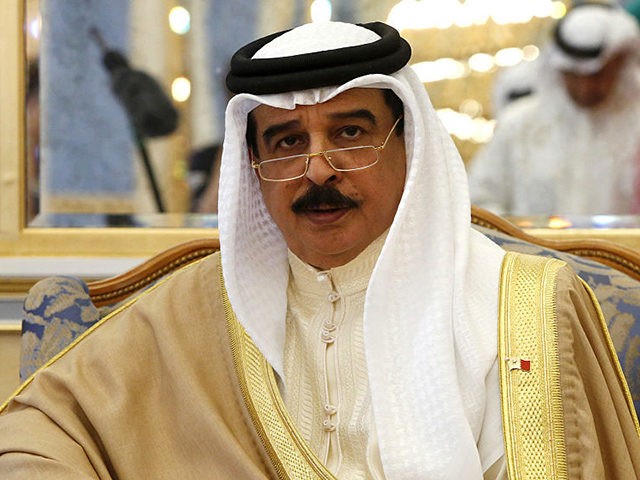King Hamad bin Isa Al Khalifa of Bahrain celebrated the normalization of diplomatic relations between his kingdom and Israel — as well as applauding the United Arab Emirates (UAE) for making a similar move shortly before Bahrain did — during remarks Thursday to the U.N. General Assembly.
Bahrain and the UAE joined Jordan and Egypt as the world’s only Arab states to recognize Israel as a sovereign state. President Donald Trump, whose administration helped broker the deals, has promised similar agreements to come in the near future between Israel and others in its geographical neighborhood.
King Hamad used the opportunity of his virtual address to the United Nations to call Abu Dhabi “courageous” for taking the first step in decades of any Arab state in establishing diplomatic ties with Israel, but also insisted that Bahrain had moved similarly while “preserving its firm position on the Palestinian issue.” The king urged the U.N. to support the establishment of a sovereign Palestine and claimed that the peace deal with Israel benefitted Palestinians by limiting Israeli “annexation.”
“From of our keenness to preserve the security and stability of the region, and as an embodiment of our resolute approach to openness and coexistence with all, we have announced the establishment of relations with the State of Israel,” King Hamad said, “sending a civilized message affirming that our hand is extended for a just and comprehensive peace, as it is the best guarantee for the future of all peoples of the region.”
“The courageous step taken by the brotherly United Arab Emirates to revive the hope of peace and stability in the region is a successful and blessed step,” the King continued. “In reaching ‘historic peace agreement’ [sic] with Israel, under the auspices and efforts of the United States of America, in exchange for stopping Israel’s annexation of the Palestinian lands, the UAE has enhanced opportunities for peace, reduced tensions, and given the people of the region a new era of understanding, rapprochement and peaceful coexistence, while preserving its firm position on the Palestinian issue.”
“We further commend the appreciated efforts exerted by the United States of America to accomplish these important strategic steps,” he added.
King Hamad did not specifically urge similar states to consider diplomatic ties with Israel, but more vaguely called “for intensified efforts to end the Palestinian-Israeli conflict in accordance with the two-state solution.”
“We consider this a cornerstone for achieving a just and comprehensive peace leading to the establishment of an independent Palestinian state, with East Jerusalem as its capital, based on the resolutions of international legitimacy and the Arab Peace Initiative, in order enter a new stage of work in which we extend bridges of goodneighborly relations to build and develop the common interests of the countries of the region,” King Hamad said.
Elsewhere in his remarks, the king applauded the United Nations and World Health Organization (W.H.O.) in the context of the Chinese coronavirus pandemic — which the W.H.O. has faced severe criticism over for its role in spreading false Chinese Communist Party claims that the virus was not contagious in late January.
“This emerging challenge has proven that the international community is in dire need to put aside differences, to strengthen areas of human solidarity, to stand united in the face of these health threats, and to improve our future readiness to prevent such risks and properly fortify our societies,” the King said.
Bahrain announced that it would follow the UAE in normalizing relations with Israel in mid-September, shortly before the General Assembly’s annual general debate. The deal between Israel and Bahrain would allow air travel between the two countries — Bahrain had already agreed to allow Emirati planes to use its airspace to reach Israel before this but itself did not accept Israeli travelers — and result in the exchange of diplomats.
“The sand was loaded up with blood, and now you’re going to see that a lot of that sand is going to be loaded up with peace,” President Donald Trump said in response to the news of Bahrain’s decision to establish ties to Israel in September. “The good news is we have many other countries now in the Middle East that want this, and that means peace.”
Bahrain, UAE, and Israel signed their normalization agreements, dubbed the Abraham Accords, at the White House last week.
White House senior adviser Jared Kushner, Trump’s son-in-law and reportedly major figure in making the agreements happen, recently revealed that, while visiting Bahrain this month, he delivered a Torah scroll to the Sunni Muslim king, for use in a Bahraini synagogue.
Bahrain’s royal family is Sunni Muslim, though the nation is majority Shiite, which has sparked some tension between the general population and the island nation’s leadership. Despite being a majority-Muslim Arab state, and unlike neighbors like Saudi Arabia, Bahrain is home to a small, legal Jewish community.
“This is a historic moment that we never expected to see in our lifetime,” Ebrahim Dahood Nonoo, the head of the Bahraini Jewish community, said in a statement celebrating normalization of diplomatic ties with Israel.

COMMENTS
Please let us know if you're having issues with commenting.